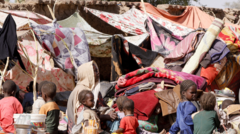Qatar's Prime Minister announced slight progress in ceasefire negotiations, emphasizing the need for common objectives amidst ongoing violence and humanitarian desperation in Gaza.**
Qatar Seeks Path to Ceasefire Amid Intensified Conflict in Gaza**

Qatar Seeks Path to Ceasefire Amid Intensified Conflict in Gaza**
Qatari officials express cautious optimism over negotiations for a ceasefire between Israel and Hamas, while the humanitarian crisis deepens.**
Qatar's Prime Minister Sheikh Mohammed bin Abdulrahman Al Thani recently announced what he described as "a bit of progress" in efforts to establish a new ceasefire between Israel and Hamas, although he acknowledged that the fundamental question of how to end the ongoing conflict remains unsolved. This statement followed his discussions with the head of Israel's Mossad intelligence agency in Doha.
The remarks came after Turkish Foreign Minister Hakan Fidan indicated that Hamas may be showing increased willingness to negotiate terms for a durable resolution to the violence. Notably, Hamas had previously spurned Israel's ceasefire proposal but is now signaling a potential willingness to agree to terms that could include the release of its remaining hostages in exchange for a significant reduction in hostilities projected to last for at least five years.
In a potential shift, Hamas has hinted it might entertain disarmament contingent on Israel's complete withdrawal from Gaza. However, it remains unclear if Israel has any intention of relenting from its current military posture. Since the resumption of hostilities following a ceasefire collapse in March, the Israeli blockade and aggressive military operations have resulted in substantial casualties, with reports indicating over 2,150 Palestinian deaths since that time, alongside the loss of Israeli personnel.
During the recent negotiations in Doha, Sheikh Mohammed expressed the need for clarity on the end goals of both parties, emphasizing that without a mutual understanding, prospects for peace remain bleak. He revealed that Hamas is prepared to release the hostages but insists on a clear vision from Israel regarding the cessation of hostilities.
Meanwhile, a Hamas delegation has been engaging in discussions with Egyptian officials, primarily focusing on ceasefire measures and addressing the worsening humanitarian crisis in Gaza. An official familiar with the talks indicated that Hamas might transfer administrative control of Gaza to any Palestinian authority agreed upon regionally.
The Biden administration has suggested that a reformed Palestinian Authority (PA) could facilitate governance in Gaza post-conflict, although Israeli Prime Minister Netanyahu remains opposed to engaging the PA in Gaza's future. Recently, PA President Mahmoud Abbas appointed Hussein al-Sheikh as his deputy, amidst rising calls for reform within the PA's leadership.
Strain remains palpable between Abbas's PA and Hamas, with Abbas recently criticizing the group for its approach and urging it to release hostages and disarm. The split between these factions has hindered the emergence of a unified Palestinian governance framework amid expanding demands and external pressures.
On the humanitarian front, the situation in Gaza is increasingly dire, with the Hamas-run health ministry reporting that casualty figures have reached alarming new heights. Recent statements acknowledge over 52,000 confirmed deaths since the outbreak of violence began on October 7, 2023, following a deadly Hamas attack. Reports are also emerging of significant humanitarian challenges as the UN warns of critical food shortages while the Israeli government insists it is adhering to legal responsibilities regarding aid provision.
As dialogue continues in Doha, Sheikh Mohammed condemned Israel's actions as part of a "starvation" tactic, while many observers remain skeptical over whether the latest discussions will yield a fruitful outcome in the protracted conflict engulfing Gaza.




















